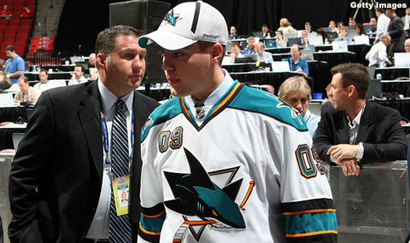For the second time in three years, UMD won the Division II national championship, beating Delta State (Miss.) 20-17 on Dec. 18 in Florence, Ala.
This year, Nielson added the Liberty Mutual Division II Football Coach of the Year award to his list of honors.
Here is the release from UMD:
After a season marked by the success of the University of Minnesota Duluth on the football field, achievements by his student-athletes in the classroom, and tireless dedication to his communities and charities, Bulldog head coach Bob Nielson today received the ultimate reward for his inspirational efforts both on and off the field. Liberty Mutual Insurance announced Nielson as its 2010 Liberty Mutual Coach of the Year Award winner for Division II. The Liberty Mutual Coach of the Year Award is the leading college football honor recognizing coaches for their sportsmanship, integrity, responsibility and excellence, on and off field.
Nielson rose above a group of five Division II coach finalists through fan votes cast Dec. 13-28 at www.CoachoftheYear.com and ballots from elite selection committees of national media and College Football Hall of Fame players and coaches. Fans votes contributed 20 percent to each coach’s final score, and the media and College Football Hall of Fame accounted for 25 percent and 55 percent, respectively. The other 2010 Liberty Mutual Coach of the Year winners include Gene Chizik, Auburn University (FBS) K.C. Keeler, University of Delaware (FCS) and Glenn Caruso, University of St. Thomas (Division III).
“Nielson embodies the spirit of the Liberty Mutual Coach of the Year Award through his dedication to his students, team and community, and fans should be proud of the significant impact they made through their votes and support for their teams, alma maters and coaches,” said Greg Gordon, Liberty Mutual senior vice president, Consumer Marketing. “As a company that values ‘doing the right thing’ as its core responsibility, we introduced the Liberty Mutual Coach of the Year Award in 2006 to celebrate responsibility in coaching because we believe it is one of the clearest examples of a positive influence one can have on young people, their families and their communities. Liberty Mutual is delighted to celebrate Bob Nielson with our award.”
This past fall, the 51-year old Nielson directed the Bulldogs to their second NCAA Division II championship in three years, defeating Delta State University 20-17 on a last-second field goal in the title game to cap off a perfect 15-0 season. In his eight years at UMD, Nielson has won four Northern Sun Intercollegiate Conference titles (including the last three in a row with identical 10-0 marks) and earned four NCAA II playoff berths while amassing a 79-21 record, the best in the school’s storied 78-year football history. Along the way, he has produced 14 All-Americans along with a pair of Harlon Hill Award finalists and has helped nurture classroom champions as well (nine Bulldogs received 2010 NSIC All-Academic Team status, including senior running back Isaac Odim, who was chosen as one of 16 National Football Foundation Scholar-Athlete Award recipents as well as the 2010 ESPN Academic All-America of the Year for football).
Nielson, who has also served as UMD’s director of intercollegiate athletics since 2004, is known throughout the Duluth area for his civic and philanthropic endeavors. This year, he was the honorary chairman of the Udac “Walk a Mile in Our Shoes” campaign, helping to provide fitness services for individuals with severe physical, mental or developmental disabilities. He also organizes and leads a Junior Football League clinic, and he and his players and staff participate in an annual fishing tournament to raise money for ALS research.
Nielson will be honored in the permanent Liberty Mutual Coach of the Year display at the College Football Hall of Fame. In addition, Liberty Mutual will make a $50,000 charitable donation on his behalf, which Nielson has designated to the Boys and Girls Clubs of the Northland, Mentor Duluth, the Northern Lights Foundation, the Udac STEPS program, and Peace in Christ Lutheran Church in Hermantown, Minn. A $20,000 scholarship award also will be presented in his name to the University of Minnesota Duluth Alumni Association. With this year’s award, the Liberty Mutual Coach of the Year winners have now donated more than $1.2 million since the award’s inception in 2006.
"On behalf of our football program and coaching staff I want to thank Liberty Mutual for this award and for their commitment to college football and the coaching profession," said Nielson. "As a coach, you work to help make a difference in the lives of those who you coach and this award certainly emphasizes the value and importance of those efforts. I am truly honored to have been selected as this year's NCAA Division II recipient."








